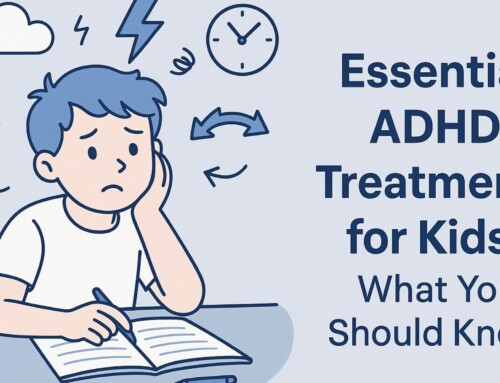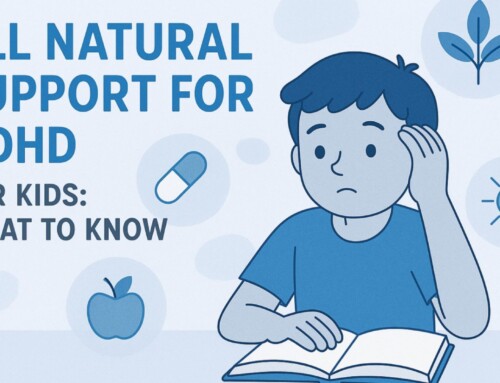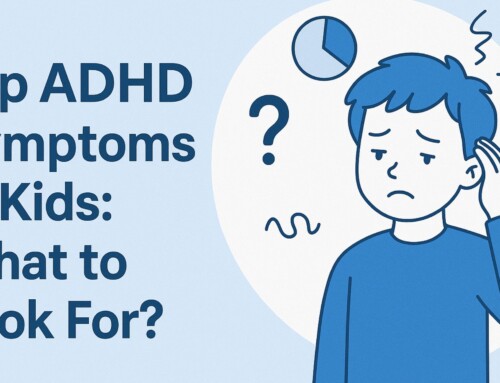Is ADHD Genetic – Concerned If It Runs in Your Family?
TL;DR
|
|---|
When a child is diagnosed with ADHD, it’s natural for parents to start tracing patterns: “Was I like this as a kid?” “Could this run in the family?”
The honest answer is: yes, ADHD is highly genetic. Research suggests that around 70 to 80% of the risk for developing ADHD comes from inherited traits (Source). If a parent has ADHD, there’s a good chance a child might too, though how it shows up can look very different from person to person.
But that doesn’t mean genetics is the full picture. Biology may set the stage, but environment, experiences, and relationships also shape how ADHD unfolds in someone’s life.
In the sections ahead, we’ll explore how ADHD is passed on, what role the environment plays, and what all of this means for families navigating the journey together.
How Inherited Is ADHD? The Science Behind It
When we talk about ADHD being “genetic,” we’re not just using shorthand for “it runs in families.” We mean it in a measurable, scientifically backed way. ADHD is one of the most heritable mental health conditions, with studies estimating that 70% to 80% of the risk comes from genetics.
That means if a child has ADHD, there’s a strong chance that a parent, sibling, or close relative may have similar traits, diagnosed or not. Other factors, such as a person’s environment, can also play a role in this tendency.
Twin studies are some of the clearest evidence we have. In research comparing identical twins (who share 100% of their DNA) to fraternal twins (who share about 50%), ADHD shows up far more often in both identical twins. This strongly points to a genetic basis rather than just environment.
But it’s not about a single “ADHD gene.” Instead, ADHD is considered polygenic, influenced by the cumulative effect of many genes. Some of the most studied genes include:
- DRD4 and DAT1, which are involved in dopamine regulation (a key brain chemical linked to focus and reward processing).
- Other genes associated with brain development, executive function, and impulse control.
Still, genes don’t determine everything. Inherited traits can make someone more likely to have ADHD, but whether and how those traits show up can vary widely.
So, if ADHD is showing up in your family, it’s not a coincidence. It’s a pattern. And recognizing that pattern is often the first step toward understanding and support.
Genetics vs. Environment: What Else Shapes ADHD?
While genes lay the groundwork for ADHD, they don’t act in isolation. Environment plays a critical role in shaping how and when ADHD traits appear, and how intense they feel in day-to-day life.
1. Prenatal Exposure to Alcohol, Nicotine, or High Stress
When a developing brain is exposed to substances or chronic maternal stress in the womb, it can impact the neurological pathways involved in attention, impulse control, and emotional regulation. For instance, children exposed to prenatal smoking have a significantly higher risk of ADHD-related behaviors.
2. Premature Birth or Low Birth Weight
Babies born early or underweight may face higher chances of developmental delays, including attention and self-regulation issues. Their brains are still catching up in critical areas during a time when others are gaining foundational skills.
3. Early Trauma, Neglect, or Significant Loss
Chronic stress in early childhood, such as abuse, neglect, or the death of a caregiver, can result in a traumatic brain injury, altering how a child’s brain processes emotion and attention. In some cases, these children are misdiagnosed with ADHD when they’re actually reacting to trauma, or vice versa.
4. Chaotic or Overstimulating Environments
Environments lacking routine, calm, and predictability can make it difficult for children with a genetic predisposition to ADHD and oppositional defiant disorder to develop effective coping strategies. For example, a noisy, disorganized home, along with excessive exposure to video games, might amplify restlessness, impulsivity, or difficulty focusing.
Why Some People Develop ADHD Later in Life (Or Seem To)?
It’s a common belief that ADHD can suddenly appear in adulthood, but in reality, ADHD doesn’t begin later in life. What often happens is that the symptoms of ADHD were always there, just less disruptive or misunderstood during childhood.
ADHD Can Become More Noticeable Over Time
In structured or supportive environments, like a small classroom or a home with clear routines, children with ADHD may cope well enough to avoid raising concern. But as life becomes more demanding, symptoms that were once manageable can grow harder to hide.
Many adults report noticing symptoms during major transitions:
- Starting university or a demanding job
- Becoming a parent and juggling responsibilities
- Managing household, deadlines, and emotional load
These stressors can “unmask” difficulties with focus, memory, organization, or emotional regulation that have been quietly present for years.
Why Adults (Especially Women) Often Go Undiagnosed?
In childhood, boys with hyperactivity or hypersensitivity often get flagged early, while girls with inattentive symptoms may fly under the radar. As a result, many women receive diagnoses in their 30s, 40s, or even later, only after years of feeling overwhelmed, misunderstood, or mislabeled as anxious or lazy.
What looks like “developing ADHD” is often really a case of finally being seen and understood.
Can You Test for Genetic ADHD?
With so much talk about genetics, it’s natural to wonder: Is there a medical test that can confirm ADHD? Here’s what you need to know:
1. There’s No Single Genetic or Blood Test for ADHD
As of now, there’s no lab test, scan, or genetic panel that can diagnose ADHD. This is because ADHD is a complex, polygenic condition, meaning it’s influenced by many genes, none of which act alone or predict the condition with certainty.
2. Diagnosis Is Still Clinical, Not Genetic
ADHD is diagnosed through a comprehensive evaluation of behavior, developmental history, symptom patterns, and their impact on daily life, which is essential for the accurate diagnosis of ADHD. This may involve:
- Interviews with parents, teachers, or partners
- Standardized rating scales
- Observation of symptoms across different settings (home, school, work)
Healthcare providers look for patterns, not a single test result.
3. Genetic Research Is Evolving
While we can’t diagnose ADHD through DNA, research is making progress, particularly regarding autism spectrum disorder. Scientists have identified several common variants of gene variants (like those affecting dopamine transport) that may increase risk. In the future, this work could help identify at-risk individuals earlier or guide personalized treatments.
4. Genetic ≠ Untreatable
A genetic basis doesn’t mean ADHD is set in stone. In fact, once properly understood, ADHD treatments are highly manageable, often with a combination of therapy, lifestyle strategies, coaching, and, for some, medication.
More Than Talk Therapy: Total Life Counseling’s Holistic ADHD Approach
Total Life Counseling offers more than a place to vent; it is where clarity, direction, and real change begin.
Whether you’re watching a relationship unravel, raising a child with ADHD, or carrying unspoken trauma, you’re not expected to figure it out alone. Our licensed therapists are trained in evidence-based methods like ARTT, CBT, and the Gottman Method to help you move from coping to healing.
Services include:
- Therapy for adults, teens, and children
- ADHD support beyond medication
- Trauma and behavioral intervention plans
- Culturally responsive and faith-based care (when requested)
- Executive Functioning Coaching
- Parent Coaching and more.Request a free 15-minute consult to help you start with clarity.
Conclusion
So, is ADHD genetic? The answer is clear: genetic factors play a major role in the heritability of ADHD development. , which is considered a complex condition. From large-scale cohort studies to family histories, research shows that ADHD is one of the most heritable psychiatric disorders.
But while attention deficit hyperactivity disorder has strong biological roots, especially involving brain regions like the frontal lobe, it’s not purely genetic. Environmental factors, such as risk factors like prenatal stress, trauma, and even lifestyle, can influence how ADHD symptoms emerge and how severe they become.
Whether ADHD is genetic or environmental, what matters most is compassionate support and evidence-based care, as highlighted by medical news. If you’re noticing patterns in your child or yourself, you’re not alone. Awareness is the first step toward change.
Frequently Asked Questions
1. Is ADHD genetic or developed?
ADHD is genetic, not something that develops later in life. If you are wondering, “is adhd a genetic mutation?”, while symptoms may show up differently across ages, the underlying traits are usually present from childhood.
2. Is ADHD genetic from mother or father?
There’s no clear rule. Is ADHD hereditary or genetic? It can be passed down from either side, or both, as it involves multiple genes.
3. Is ADHD a genetic disorder or caused by lifestyle?
Is ADHD genetic or environmental? Yes, though it’s also influenced by environment. It’s not caused by poor parenting or diet, but by a mix of genetic and neurological factors.
4. Is there a genetic test for ADHD?
No, there isn’t. Diagnosis is based on symptoms, not DNA. Research is ongoing, but testing isn’t used clinically today.
5. How genetic is ADHD, really?
Wondering how genetic is ADHD? Very. Studies show it’s one of the most heritable mental health conditions, with genes explaining up to 80% of the risk.
Filed in: ADHD, Blog, Gemima McMahon
Share This Story, Choose Your Platform!
Total Life Counseling Center consists of Licensed Counselors, masters level therapists, Español counselors, Licensed Mental Health Counselors, business coaches, and image enhancement coaches who provide counseling for emotional, mental, physical and spiritual care including marriage, individual, family, substance abuse and more. TLC’s family, trauma and marriage experts have been interviewed on National and Local TV/Radio over 200 times for their expert advice on Fox News, OWN, WETV, ABC’s Medical Minute and more. Our skilled counselors are relational, approachable and specialists providing therapy services in the Central Florida area including: Orlando, Winter Park, MetroWest, Windermere, Dr. Phillips, East Orlando, Lake Mary, and Clermont, Boca Raton Florida, and Dallas, TX.






